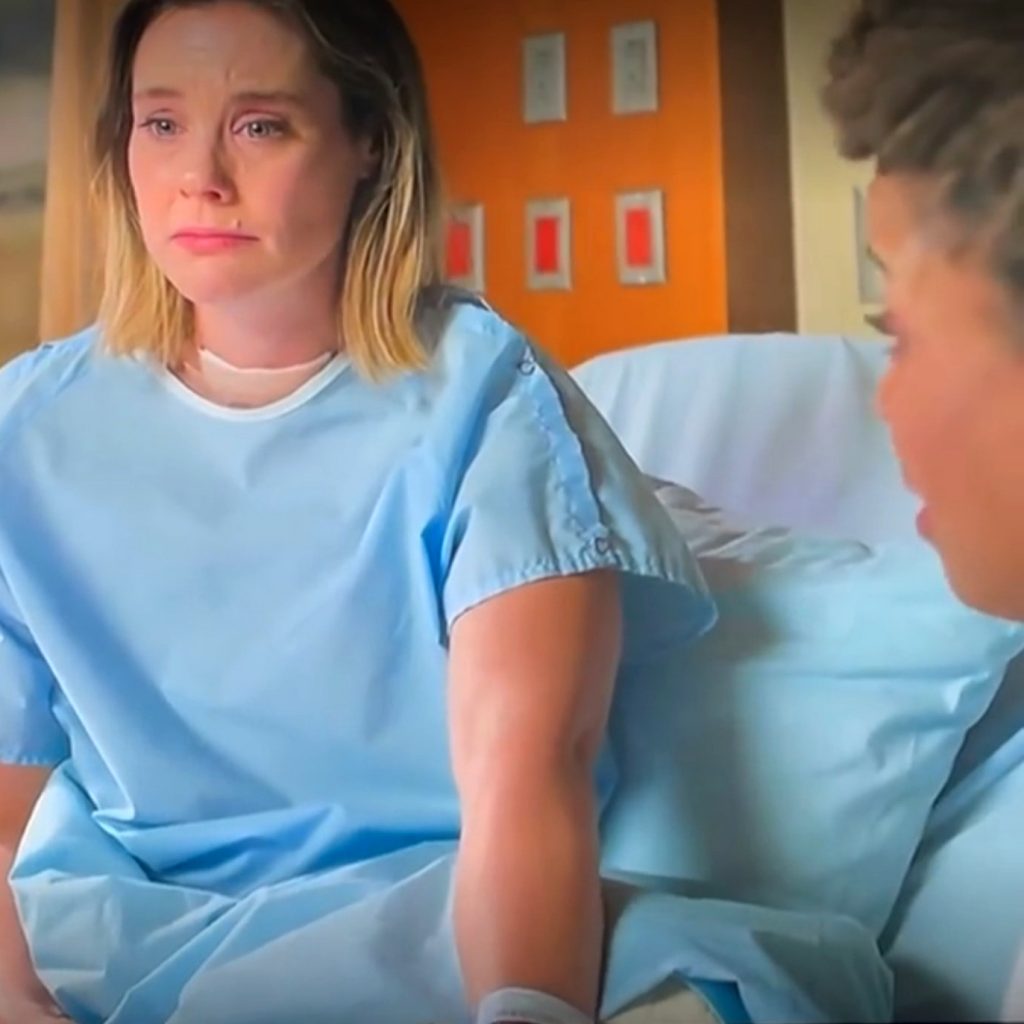
by Andi Last
Recently, ABC Television's The Good Doctor featured a woman receiving the news that she has LFS: "It's called Li-Fraumeni syndrome, LFS. An inherited predisposition to developing a wide range of cancers." You can watch the episode here.
While this wasn't the first time LFS has been featured on the small screen, or the big screen, watching this scene in particular brought back memories of receiving my own diagnosis of Li-Fraumeni syndrome, and made me realize how different the experience may be for each of us. I asked our community to share their very personal stories of being diagnosed with Li-Fraumeni syndrome. If you'd like to share your own LFS diagnosis story, please add it in the comments below.
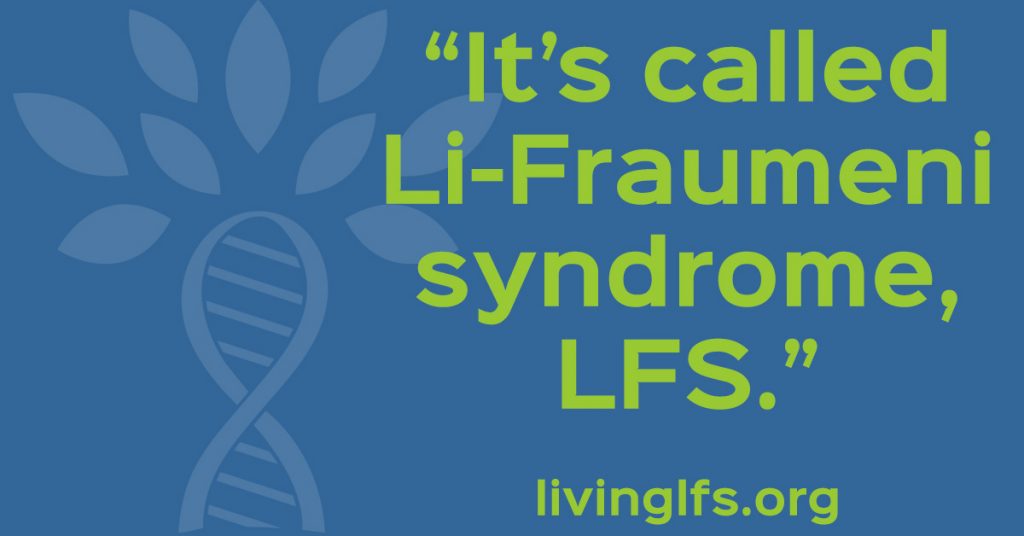
Andi L: the "fascinating" defense
I was in the midst of making treatment decisions for breast cancer in May of 2015 at the age of 41. Because of my relative young age for developing breast cancer, I was assigned a genetic counselor who took down my family history: my father is healthy after 4 different primary cancers, his brother had died at age 11 of a brain tumor, their mother and grandmother had both died of breast cancer. The genetic counselor said then she thought it was likely I had LFS, and that I should consider genetic testing, but she said I didn't need to make that decision now. It could wait until after treatment, or even later. I decided to wait. That lasted about two weeks before I decided I really needed to know. I got tested for mutations in BRCA, TP53, and many other genes.
The genetic counselor said I was positive for a TP53 gene mutation that caused Li-Fraumeni syndrome. She said I also have a mutation in the ATM gene. Not much was known about ATM yet, other than the fact that it could play a role in cancer development as well.
She seemed somewhat excited and fascinated by this diagnosis, so I think I followed her lead, and I found my new-to-me genetic aberrations absolutely fascinating as well - as if the news didn't apply to me.Like I was learning about a science experiment. My brain didn't fully comprehend the weight of the LFS diagnosis - or chose not to, as a defense mechanism. (My father also tested positive for the TP53 mutation, and he took the news very matter-of-factly as well. Finding out we were LFS mutants certainly explained that we as a family didn't just have bad, cancery luck.) I focused on learning everything I could about the specifics and the treatment of my breast cancer. It wasn't until much later, after chemotherapy, that I understood LFS would mean a lifetime of surveillance and scanxiety (a cancer patient/LFS mutant term for the sometimes unmanageable anxiety you can get every time you need an MRI or a mammogram or colonoscopy or even a blood test) as well as second-guessing, potential loneliness and isolation, and constant, outright fear. It is overwhelming.
As the doctor tells the new LFS patient in The Good Doctor, "Most cancers are treatable if found early enough. We know the most common associated with LFS, and we can do surveillance and nip anything in the bud before it becomes a problem. It may not seem this way now. but this is good. We know what we're dealing with. We're warned. And we'll be ready."
This reassurance is helpful as you're trying to process the news, along with how you're going to tell your family, whether to have your children tested, how you'll pay for all of this, and what your life looks like going forward. It's helpful, but it doesn't make anything better - at least not at this stage. Having an emotional support system is absolutely critical. This is why Living LFS exists. Thank you to The Good Doctor for shining a light on LFS, and thank you to all who support Living LFS and our Li-Fraumeni syndrome patient community. Read on for more stories of being diagnosed with Li-Fraumeni syndrome.
Tom C: the usual laugh and cry
In late 91 early 92, when all hell was breaking loose in our family, doctor after doctor was saying that it couldn't be genetic. They insisted we had totally different kinds of cancer and multiple siblings and two nephews were just really bad luck. In early 92 I saw a bullet on front page of the WSJ that referred me to an inside article. It spoke of these two researchers who had uncovered a rare genetic syndrome.....you know the rest. I called and shared with my family just ahead of my own pending biopsy for colon cancer.
When the biopsy came back cancer, we already had a family gathering planned that evening at my sister's. I knew they would expect the results of the biopsy but it was too early in the game to have an LFS diagnosis. I made a small patch and secured it over my Levi patch on the back of my jeans. When I walked in they looked up in expectation and I simply pivoted pointed to the patch and asked if they liked my new "P53 jeans". We did the usual laugh and cry stuff. Jen (Mallory, Tom's niece and founder of Living LFS) was 16 by then and had already lost her brother Bob. Her Dad would be gone two years later. Truth is, when Judy Garber called me from Dana-Farber after the surgery with results we talked in circles. I gave her a chance to tell me I didn't have it. When that didn't happen, I told her I didn't want to know, what I already now knew. In those years there was no kind of screening protocol, no real medical understanding and little advantage in knowing. But there were the concerns with insurance, employment and whatever. I only formalized the diagnosis years later with NIH. The diagnosis is so matter of fact now, and the benefits of being informed are huge, but it certainly was not in 1992.
Someday, we'll all be together at some meeting post pandemic and I will share examples of just how sick/funny we have gotten. Although it was easier when it was just siblings and I. It takes on a new dimension with my daughter and grandkids. Hugs are good too. So virtual hugs to you.
Fannie L: I hate it. I really do.
I think I was about 14 years old the first time I realized something was wrong with my mom’s side of the family. Between my mom, her parents and her four siblings, five people got cancer before they’d hit fifty. It doesn’t take a genius to know that’s not “normal”. I had two theories, the first being that there was something wrong with our genes. The second, more eccentric/fun, was that my grand-parents’ house was built on an alien source of radiating material that made the entire family sick.
I started surveillance on my breasts when I was 25 years old, thinking I had one of the BRCAs. My mom and my aunt got breast cancer in their 30s so it was my best guess at the time. That being said, I only got serious about my potential genetic issues when I started planning for our first child. There were some hereditary mental illnesses on my dad’s side and I wanted to see if I were a carrier (I wasn’t). That’s when I met a genetic counsellor for the first time.
After doing my family history, the counsellor suggested I finally get tested for the BRCA mutations “and for this other syndrome that is incredibly rare, but while we are at it, why not”. They needed to test my aunt, since she was the only survivor in my family that fit all the Li-Fraumeni Syndrome criteria, one of them being having had cancer.
When her test results finally came back after months of waiting, we were shocked to learn that she didn’t have a BRCA mutation, but Li-Fraumeni Syndrome. I was already three months pregnant at the time and the news hit me like a sack of bricks in the face: “What if I passed it to my baby?”
The moment the news fell about my aunt, I knew I had it too. Since my mom died, I had been thinking that it was going to be my fate too: dying at 45 of breast cancer (now getting to live to 45 seems like a dream). But I had this baby in my belly, and I wanted to enjoy our first months together without this illness hanging over us. I thus decided to wait a little before getting tested. Nine months, I waited. Nine months. Those nine months were, by far, the best months of my life. I had waited so long to find the perfect partner and to become a mom. To have a lovely and happy family. We were golden. We had it all.
When I finally received my diagnosis, all I could think about was my son, Finn. What if I had passed this horrible disease to him? Why didn’t I wait a little longer to get pregnant? I should’ve been more careful. I didn’t even care I had Li-Fraumeni. I was paralyzed with guilt and self-hatred. How could I have been so selfish?
For me, having Li-Fraumeni and cancer has always been tightly linked to motherhood. Even today, the main reason I hate this illness is because it prevents me from being the mom I always thought I would be. It robbed me from the motherhood I dreamed about for so long. Because, let’s face it, I’ll probably miss it all. His first girlfriend/boyfriend, his graduation, his first real job, his wedding… I’ll never be a grandma. LFS stole all of this from me and more. And I hate it. I really do.
Beth L: shocked is an understatement
My aunt died of breast cancer at 45 (she had it twice). My father died of lung cancer at 49. My grandfather died of colon cancer at 52. I started getting Lipomas all over my body. I have actually had over 20 removed over that last 10 years. I was talking to my doctor’s PA…. explaining how I was concerned about all of these lipomas and that my family died so young. She told me to “ stop obsessing about cancer” and that I was fine.
The next week was my annual with my gynecologist. I was talking to her about what had happened at my doctors office. She looked at my chart and ordered the BRACA testing.
I went the genetics doctor and after going over all of the cancers in my family (and at young ages) she decided to test me for everything.
To say that I was shocked when I got the call that I had LFS, is just an understatement. I was 41 years old. I tried to learn as much as I could about LFS and had a full hysterectomy and double mastectomy 5 months later. I am now a patient at Levine Cancer in Charlotte, NC.
I spent the next few years doing all of the screening (and found out that 2 of my children also have LFS). In September 2018 (46 years old) a routine breast MRI found an enlarged lymph node under my right arm…. this turned out to be stage 3 melanoma (with NO point of origin). I underwent a year of immunotherapy and as of December 2019 have been cancer free (except for a carcinoma that had to be cut out of my back).
The absolute worst part of LFS is that i gave it to my children. They have their yearly full body MRI’s, twice yearly stomach ultrasounds, and twice yearly blood work. Thank the Lord they have been healthy and had no cancers.
Ilonka D: damaged, broken, and a weird relief
We were still sitting on our baby cloud when I found out I had a breast cancer relapse on January 6, 2014. In November I'd just given birth to our miracle baby, Dylan. A child, given the statistics with all the previous chemo I was given, I shouldn't have been able to have. Again, chemo and radiotherapy followed. At that point at last someone had woken up in my medical team. I was referred to a clinical geneticist and after a few weeks of waiting it became clear that I have LFS. It turned out that I'm de Novo. The only one in our family with this genetic disorder, and I had at least passed it on to our oldest son Kaj. Kaj who had just finished his treatment for neuroblastoma stage 4. In one swoop, the big bad cancer had blown away our just re-found family happiness away again.
Many times, especially during my son's treatment, I wondered and doubted myself if I hadn't done anything awfully wrong which was causing these terrifying cancers. So, from that perspective it was a weird relief to find out I have LFS. The cancers were caused by a mutation and not by anything I ate, drank, or how I was living. For a very long time I've struggled with guilt feelings. Guilt that I had passed this mutation on to my oldest son. That he had to endure such painful treatments for neuroblastoma and glioblastoma. Guilt feelings towards my husband and our family. I literally felt damaged and broken.
A lot has happened since my LFS diagnosis in 2014 and the present. More cancers, and the greatest loss imaginable for a parent. I love my husband Marc and Dylan dearly, but my love for Kaj is only for him, and that love will always remain for him. That love is also my biggest stumbling block. For a longe time after his death, my love for Kaj had bruised me. Time does not heal all wounds. It's an ongoing struggle to balance the desire to live in a way that honors him and his time on this earth. With grief in one hand, and the 'happy' life after loss in the other. My annuals and scans, of which I am entitled to because I am diagnosed with LFS, have literally saved my life twice now. For me knowledge really does give a feeling of power! Meeting other mutants via the Living LFS support group was also a major life turner, in a very positive way. I feel so grateful to still be here after three primary cancers and one relapse, and we hope to find a different kind of happiness in our family's future.
Alison S: grateful, helpful
I was diagnosed with LFS at age 60 after three cancers in three years, (skin, uterine and breast) it was recommended that I get genetic testing done. The assumption was that the BRC genes might possible be present. I was scheduled for a lumpectomy with High Dose IMRT (Intensity Modulated Radiation. Therapy) the day before my scheduled procedure my Genetic testing results came in and showed LFS.
Fortunately my surgeon knew about LFS and cancelled the radiation procedure right away. While my surgeon had never treated an LFS patient, she had read about it. She was able to put me in touch with Doctors at NIH, John’s Hopkins and Dan-Farber Cancer Institute. Those doctors were able to give me a lot of information, and also worked with my surgeon and oncologist to guide my treatment plan moving forward. I was so grateful that my results came in when they did, and that my surgeon was so willing to research and listen to the DFCI and NCI doctors and follow their lead with my treatment. This past Tuesday I had surgery for the breast cancer, and was great full that the LFS diagnosis was taken into consideration during the mastectomy process.
My LFS diagnosis shed light on my father’s Cancer and all of his siblings who had cancer. And I was able to share this info with my own siblings, and cousins. The hard part was telling my adult children, so that they could get tested and also knowing what the implications might be for my grandchildren. I have the low-penetrance LFS mutation, but further testing of tissue samples confirmed that it is germ line. I am hoping to be a part of any available studies in hope it will shed light on why the LFS waiting so long to affect me, in hopes it might help others. So while it was a shock, it has also been very helpful in guiding my treatments and hopefully give my children and grandchildren information to guide their health journeys.
Christy B: the "lucky" one
I went to a GI specialist that asked if I had ever been genetically tested I said no so I got tested… July 23, 2019, the day before my 40th birthday I was told I had LFS. 3 months later we had our only daughter tested and she is positive too. I was the “ lucky” one who got to tell all the family 😞
Emily P: go with the flow
I started LFS before even knowing it existed, with an adrenal tumor when I was 2 in 1987! Fast forward to 2 weeks after my 29th bday in 2014 and I was diagnosed with breast cancer. They found my brain tumor during baseline scans for breast cancer treatment.
Because of my collection of tumors, my oncologist had me tested specifically for LFS which I didn’t know even existed. Now, I know a shit ton more about it than ever and learn new things constantly!
Since finding out, I just go with the flow and live life the best I can. It’s stressful and rough sometimes, but knowing other mutants in the world has DEFINITELY helped me process it all!
Mary-Jean S: shock, anger, worry
My father had his first cancer at 40 or 41, the year I was born. (It was a liposarcoma.) I barely knew he had had cancer at all when he got his second, fatal, cancer (pancreatic). I was only 13. Fast forward some years, and my older sister was diagnosed with breast cancer at age 27. She got what was probably the standard treatment at the time, which was a mastectomy, relapsed a year and a half later, and died about five years after that. I was terrified that I would also get breast cancer when I reached 27, but I didn't. However, I did in my late forties. Treatments had improved, and, after I had finished chemo and had a double mastectomy, my oncologist said that I was cured, and told me I could look forward to the rest of my life. I only wish! All was well until March of 2013, when my 12-year-old son was diagnosed with brain cancer. After I had gotten over the shock, and he had survived his initial brain surgery and was preparing for further treatments, I asked for a referral to genetics. None of this seemed random to me. He was tested for LFS. His blood was sent to Baylor Labs, in Houston. The result was negative. The geneticist failed to tell me that he was surprised at the result. All he said was that we didn't have to worry.
Five years later, when my son was in remission after a relapse, I read about some genetic research that was being done on his cancer, and also his specific subtype. I asked about testing for some of these genes the researchers were studying. We got another referral to genetics, and another sample from my son was sent, this time to Invitae Labs. They tested it for over sixty genes. The only one that came back as mutated was the TP53 gene. Baylor Labs had screwed up in a huge way. I knew immediately that I had it too. There was no way Danny could have gotten the evil gene from anyone else. How did I feel? Mainly, furious at Baylor Labs. Extremely furious. What do you do when you think you can rely on lab results, and then find out they are wrong? If I had been found to have another cancer then, which could have been caught if I had known I had LFS, I would have sued. As it happened, I didn't.
So it was a shock, yes, but my main reaction was anger. After the anger faded, I kind of shrugged my shoulders. I had reached sixty, and had survived the only cancer I had had. I felt much worse for my beloved son, who had to deal with brain cancer, and for my other children, who might also have this horrible genetic curse. Since then, it has become more of a worry, mainly because I can't really afford to have all the scans I should. So I do notice every twinge and think about whether I should see the doctor. I had to have a hip replacement - I was so crippled I was headed for a wheelchair fast if I didn't. And the surgery required lots and lots of x-rays. I hated that. And I know the orthopedic surgeon didn't really get why I didn't want them, although I explained. He said he would use as few as possible, but I very much doubt that he did. But I couldn't go on living the way I was, in constant pain from bone on bone arthritis. My son died in April of 2020. I know the hell of LFS. I lost my father, my sister, and my son so far. I have it, my brother has it (he is still alive and well at 65, and has only had skin cancers), and my two other children live under a cloud because of it.
Katrina J: live life real hard
In 2008 I was 30 and my brother had just died, 24 hours later I felt something in my breast and it hurt, a lot. I kind of freaked and jumped on a VIP list nobody wants to be on. I was tested for the BRCA mutation and was negative. For 10 months I went through treatments and then I started life again.
For 5 1/2 years I stressed. I had red spots, pain and worry. I finally came to terms with what would make me feel better… a bilateral mastectomy. So when I went for my yearly mammogram and demanded the surgery. I was told it was no longer my choice. I had relapsed. I decided at that point I needed further genetic testing and was diagnosed with LFS. I had a bilateral mastectomy, full hysterectomy and chemo.
I get checked every year. So far so good. My 2 boys get checked too. It's our new normal. We are on cancer watch. It's all good really. We are a super tight family and live life real hard. I think after cancer the sky is bluer, the sound of rain sweeter and love… it is so deep. With LFS comes stress and anxiety at times but dang that sky is sooo blue, the rain so powerful and I love so hard it hurts a little.
As you can tell, all of us who have received a diagnosis of Li-Fraumeni syndrome for ourselves or our loved ones deal with a range of emotions including shock, fear, anger, and worry. Some also feel relief to know why this is happening. A sense of control over the future, knowing that surveillance is available to us to identify and begin treating any potential cancers as soon as they begin to develop, when the chances of successful treatment are the highest. Perhaps we also see a diagnosis of LFS as an opportunity to re-prioritize what's really important to us in life.
Share your LFS diagnosis story in the comments, and remember, emotional support is important. If you haven't already, join our private Facebook support group to talk with others who have experience and understand what you and your family are going through.
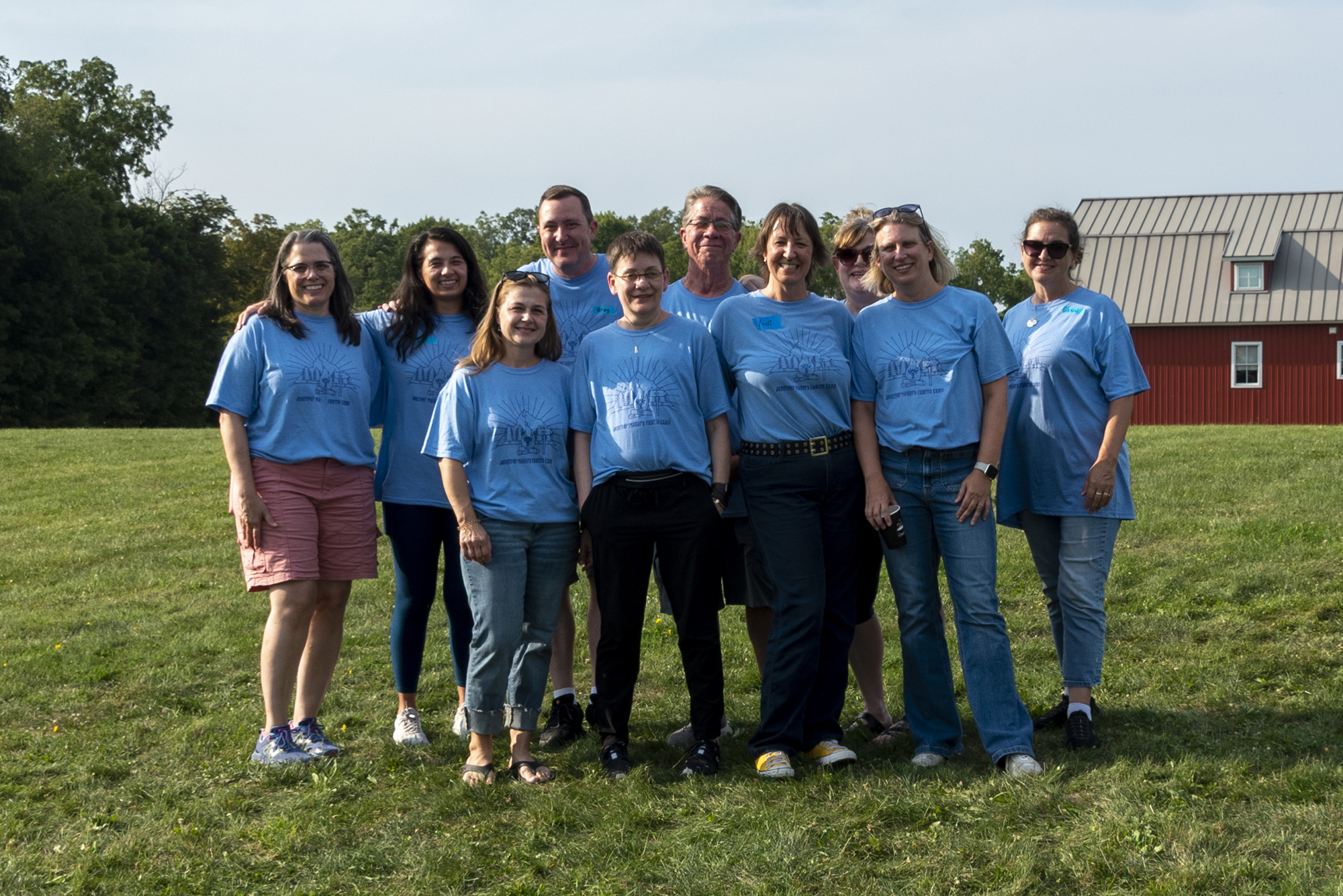
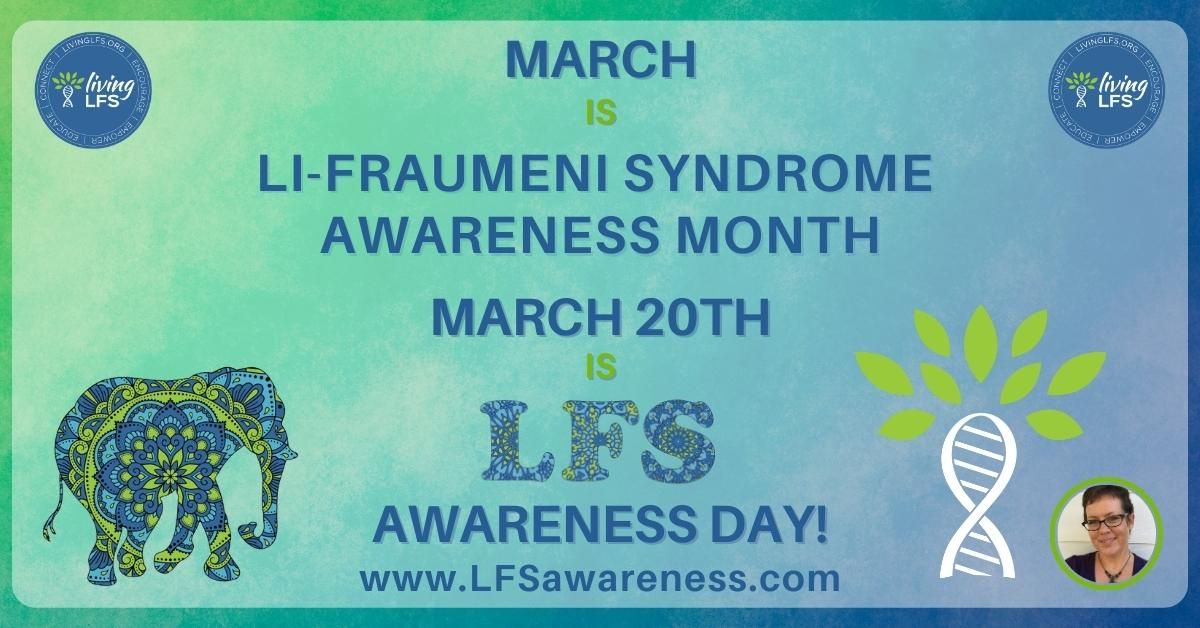
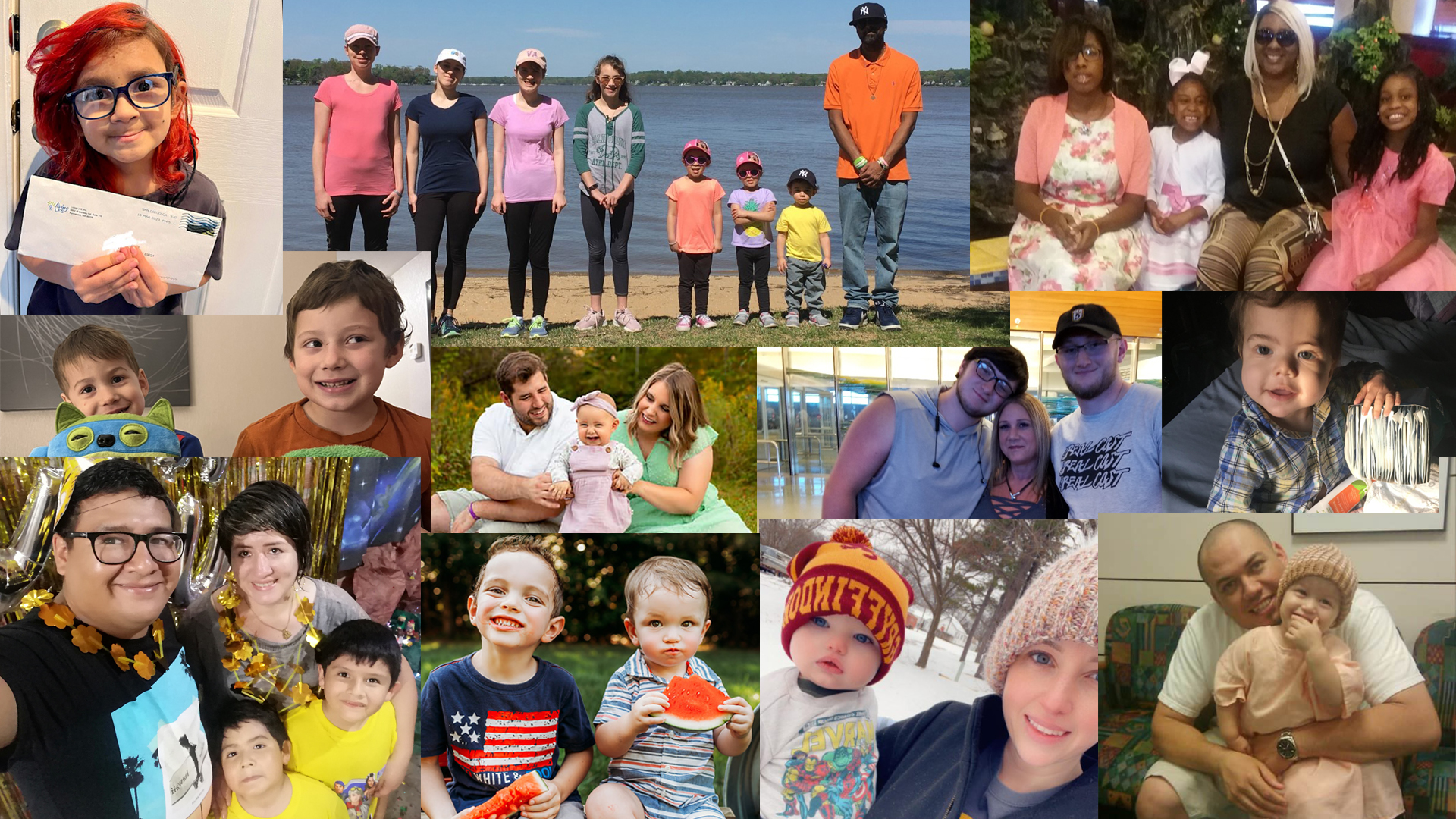
One Response
Ashley Jones Philadelphia
The result leave you speechless in the end broken
My name is Ashley Jones I got stage 2b breast cancer At the age of 30 my tumor was 6 cm a size of a peach 🍑 seed leaving the doctor speechless in the end. I had Chemotherapy 2 years I am the first one in my family with the history with LFS March of 2017 I had a double mastectomy reconstruction surgery at University of Pennsylvania in Philadelphia.I didn’t know much about LFS Doctor Maxwell my genetics doctor took a biopsy it came back a month later saying I have LFS. I remember Jackie Powers who works for Penn as well Telling me the news I was speechless but I always knew something was wrong I didn’t know what is was at that moment left me speechless and broken. I have 3 beautiful children Meah ,Marykate , Christian they are my world they keep me going everyday and I wanted to share my story with the world and help others with LFS I am currently 36 yrs old.